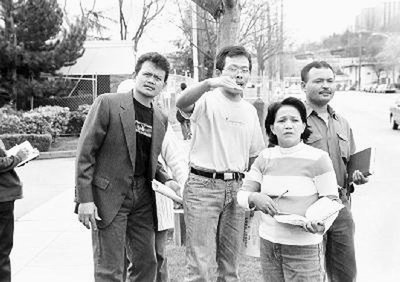April 11, 2002
Indonesian teachers learn ‘in context’ skills at UW
Steve Hill University Week | ||
|
The influence of the UW’s C-STARS program is reverberating through Indonesia this week.
The College of Education’s Center for the Study and Teaching of At-Risk Students, or C-STARS, played host to about 60 middle school teachers from Indonesia during spring break and the first week of spring quarter. The teachers were here as part two of a three-part journey to familiarize themselves with contextual teaching and learning pedagogy. It’s an integral part of that nation’s increased emphasis on public education.
“In the last 15 or 20 years the government has started to realize that education is very important, maybe the most important thing to be taken care of,” said Kasihani Kasbolah, who goes by Ani.
Kasbolah, a former classroom teacher who earned her master’s and Ph.D. in the United States, is currently a professor of education at Indonesia’s University of Malang. She was selected by the Ministry of National Education to help retrain teachers.
The UW’s Mimi Heggelund, the international education specialist for C-STARS, was chosen by the ministry to partner with Kasbolah, the University of Malang and the University of Surabaya.
In September a C-STARS International team — including Heggelund, Gene Edgar and Sarah Stachowiak from the College of Education; graduate students Tamara Nelson and Anita Lenges; and Western Washington University professor Angela Harwood — led workshops in Indonesia for the middle school teachers.
That was followed in October by a trip to the U.S., where the teachers could put theories of contextual teaching and learning into practice as well as observe teachers in Seattle-area classrooms.
In November, the first group of middle school teachers finished their training with another month in Indonesia, synthesizing what they had learned throughout the program.
Similarly, the group that just left Seattle will spend the next month in Indonesia completing its training and finalizing plans to bring a new approach to their teaching.
The practice of contextual teaching and learning, or CTL, is hardly a radical concept by American standards. The idea is to make the classroom as relevant as possible.
“Good teaching starts with involving and engaging students in their own learning, making sure the learning and instruction is relevant and meaningful to the student,” Heggelund said. “To do that a good teacher connects a student’s academic learning in the classroom with his life outside the classroom.”
But Kasbolah says Indonesian classrooms have generally been more sterile, more insulated and more passive.
“For years it’s been a teacher-oriented approach,” she said. “Everything comes from the teacher and the students were supposed to sit sweetly and quietly and listen. But then, because of the development of other countries and also this globalization era we have to do something. Our students need to see the real world. Not just from the textbooks and from the teacher’s knowledge.”
In fact, Heggelund believes the Indonesian people are beginning to see education as the way out of a harmful cycle.
“There’s a lot of poverty and extremism there,” she said. “I think Indonesia is beginning to believe that education is the way to change.”
One approach to spur that change is to energize the classroom. Instead of students sitting and listening to lectures, Kasbolah and Heggelund envision the day when classrooms will be full of exuberant youngsters asking questions that will help them relate what happens in school with their lives at home and ultimately, with the world beyond.
“If you’re going to eradicate poverty, you need to teach the young kids that there is hope and more to life, that they can get training, they can get jobs, they can do better for themselves,” Heggelund said.
If the students and their teachers can make that leap, Kasbolah is confident that her country can prosper.
“The students in Indonesia are not stupid,” she said. “They are very smart, but because of the teaching strategies they could not develop their critical thinking skills. But now teachers have various strategies for teaching and it’s getting better and better. I believe that if more teachers in my country can change the way they teach, change the strategies, get children to think and ask questions, I’m quite sure my country can be a strong nation.”



